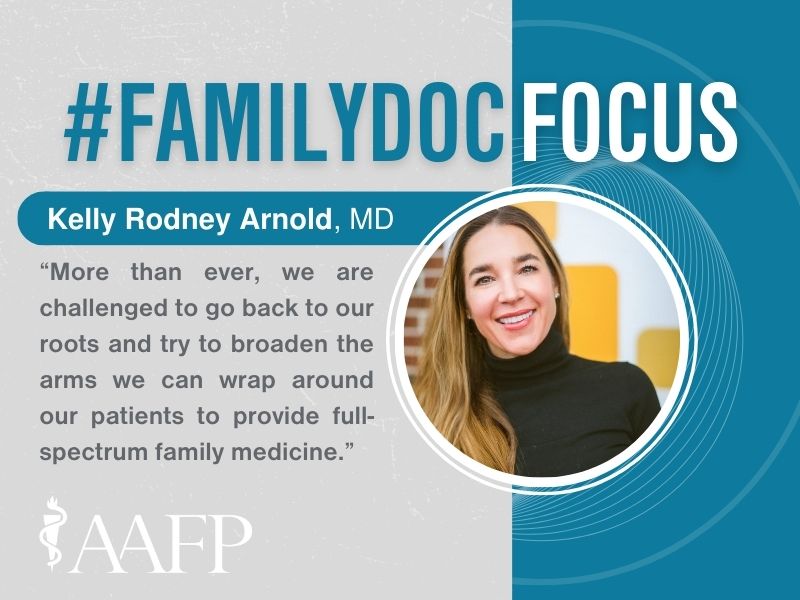FP’s Innovative Clinic Brings Affordable Care to Underserved
Sept. 8, 2023, David Mitchell — Kelly Rodney Arnold, M.D., was destined for a career in family medicine.

Her great grandmother and grandfather were family physicians. Her father, William MacMillan Rodney M.D., is the former chair of family medicine at the University of Tennessee Health Science Center and founder of the Memphis-area Medicos para la Familia, where her brother, John Rodney, M.D., is the medical director.
“It literally has been family medicine for us,” Arnold said. “We all are passionate about what family medicine means. More than ever, we are challenged to go back to our roots and try to broaden the arms we can wrap around our patients to provide full-spectrum family medicine, which for us also includes surgical obstetrics, office procedures and defragmented care.”
Arnold grew up listening to her parents’ discussions about caring for underserved communities. Her path to medical school, she said, seemed not only likely but “inescapable.”
Not that there weren’t a few detours on the way.
Arnold majored in Spanish at the University of Tennessee, spending a summer in Mexico and a semester in Argentina. She considered pursuing a Ph.D. in Spanish and a career in academics, but as she was completing her undergraduate degree, her parents were launching a family medicine clinic that focuses on delivering affordable care to people who are uninsured and underinsured in Memphis’ Latino community.
“Working in my parents’ clinic really sealed for me what my calling was,” she said. “What energized me was the opportunity to couple the Latino community with my love of science and the medicine in my veins.”
During medical school at the University of Tennessee Health Sciences Center, Arnold spent a summer in Cuba and made medical mission trips to Ecuador and Guatemala. Both at UTHSC and later as a resident at the University of Tennessee College of Medicine, Chattanooga, Arnold often found she was one of the few people who could translate for Latino patients.
That was a barrier to care she would not accept when she opened her own practice, Clinica Médicos, in 2015 in Chattanooga. Every member of her staff of more than 50 people is bilingual.
“We are going to be not only culturally competent, but also culturally immersive,” said Arnold, who serves on a number of local boards and committees.
Arnold built her clinic using her parents’ business as a model. Clinica Médicos is open every day to patients with or without insurance.
“We eliminated logistical barriers by being open seven days a week,” she said. “Anyone can come any day. No appointment? No problem. By being open Saturdays and Sundays, we essentially drove 25% of unnecessary care out of the ER. And patients are cared for in a continuity fashion. This makes incredible sense for working families and saves many from financial ruin.”
The clinic offers a wide range of services, including procedures, labs and imaging at a fraction of the market price, she said.
“Health care is becoming progressively more unaffordable,” Arnold said. “People are hungry to find a site that’s reliably open, answers the phone in a timely way, messages are returned and needs are addressed in continuity by invested physicians. Ninety percent of our patients don’t have to be referred out because most of their needs are going to be addressed here.”
In 2021, Arnold established the nonprofit the Médicos Mission Fund, which has given the clinic more financial flexibility.
“I slowly learned to be a fundraiser and a grant writer,” she said. “Learning the mechanics of the 501(c)(3) world and how it can benefit patients has been an eye opener for me and has been a real source of fuel to accelerate our cause. It has a lot of potential to grow.”
The clinic’s foundation supports the renovation of a nearby building where Clinica Médicos will offer mental health services and pediatric dentistry to uninsured and underinsured people starting next year.
Clinica Médicos already cares for about 30,000 patients a year, and Arnold said she expects that number to grow tremendously in the next five years due to expanded services and the area’s growing Latino population, which doubled between 2010 and 2020.
“We talk about health care having such complex problems, and I wanted to go back to the basics and say, ‘Well, I think some of the solutions are pretty simple,’” she said. “Some of those simple solutions are born out of the power of independent practice. I can assess a problem and be nimble and independent enough to adjust my practice accordingly, all the while staying patient-focused and patient-led.”
The clinic also offers a maternal health fellowship and is a training site for residents from the University of Tennessee Family Medicine program.
“It’s more important than it’s ever been to teach the next generation of physicians that independent practice not only thrives, but also offers high satisfaction,” she said. “It is a crucial part of the equation in providing solutions for many of the frustrations that physicians face feeling that their hands are tied. In our system heavy with mergers, employment and administration, physicians at times lack the liberty to act upon what is morally, ethically or practically the right next step.
“Teaching young physicians solid independent practice models for underserved communities is just as important as the excellence of the care we deliver. And as such, honoring and sustaining the work of those dedicated to teaching and leading health care for underserved communities will be an ongoing goal of mine through the Médicos Mission Fund.”